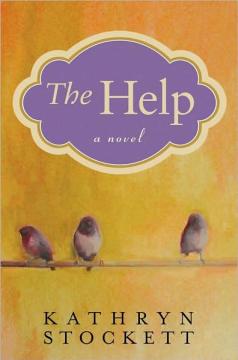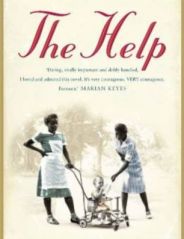 I just finished “The Help,” by Kathryn Stockett. Thanks to some slow mornings at work, I devoured this 451-page book in two days. I literally couldn’t put it down, folks. That’s what I was doing last night instead of helping my husband with dinner, exercising, cleaning the kitchen, or processing pictures for recipes, like my “to do” list was trying to instruct me. And a book has got to be reeeeaaaallly good for me to not only ignore my whiny-butt “to do” list, but to cease to hear its naggy bleatings altogether.
I just finished “The Help,” by Kathryn Stockett. Thanks to some slow mornings at work, I devoured this 451-page book in two days. I literally couldn’t put it down, folks. That’s what I was doing last night instead of helping my husband with dinner, exercising, cleaning the kitchen, or processing pictures for recipes, like my “to do” list was trying to instruct me. And a book has got to be reeeeaaaallly good for me to not only ignore my whiny-butt “to do” list, but to cease to hear its naggy bleatings altogether.
This amazing book is written from the perspective of three Southern women in the 1960s, one white 23-year-old who just moved back home from college, and two black servants (they are ‘the help’). They all narrate in the first person, in alternating chunks of chapters, and they all have their own truly unique voice. The location is Jackson, Mississippi, during the Civil Rights movement. The book chronicles their everyday lives, their struggles with their families and employers, and their thoughts and emotions as they grapple with their positions in life, their socially imposed limitations, and also their dreams. There’s a great historical backdrop, but the book doesn’t feel like a “historical” read. It’s actually . . . a lot of fun. Am I allowed to say it’s “fun” when it deals with such weighty racial topics? Well, I guess I just did. In fact, it’s deliciously entertaining. The three characters’ stories come together in the meat of the plot: a big project they embark on together that could put everything at risk for all of them, white and black alike. I won’t tell you more–you’ll just have to read it. But I have to say at least this: it has a happy ending! A hopeful, happy ending. So if you’re someone who really gets into a book and gets really depressed when at the end all the characters get divorced, suicidal, murdered, and drowned, don’t worry–this book won’t do that to you.
Both the surface of the book and the depth of the book are good; on the surface, the writing style is great.  Plus, you get the inside view on three lives and the homes the black women work in, with details about the bedspreads, the white ladies’ wardrobes, tantrums, the color of their refrigerators, what they had for lunch–it felt exciting and fun, like I was getting to sneak around with nobody to stop me and spy on people living in another era. But the true depth of the book is rich and excellent: its themes of love, respect, courage, and friendship are fully fleshed out in all their complexity and goodness.
Plus, you get the inside view on three lives and the homes the black women work in, with details about the bedspreads, the white ladies’ wardrobes, tantrums, the color of their refrigerators, what they had for lunch–it felt exciting and fun, like I was getting to sneak around with nobody to stop me and spy on people living in another era. But the true depth of the book is rich and excellent: its themes of love, respect, courage, and friendship are fully fleshed out in all their complexity and goodness.
The author is from Mississippi herself, and writes very much from her own experience growing up with a black family maid who took the place of her absentee mother, physically and emotionally. In the few pages explaining her background, Kathryn Stockett pens “I’m pretty sure I can say that no one in my family ever asked Demetrie [their maid] what it felt like to be black in Mississippi, working for our white family. It never occurred to us to ask. It was everyday life. It wasn’t something people felt compelled to examine. I have wished, for many years, that I’d been old enough and thoughtful enough to ask Demetrie that question. She died when I was sixteen. I’ve spent years imagining what her answer would be. And that is why I wrote this book.”
The storytelling is great, and moves the book right along–in fact, let me throw the word “riveting” out there. It’s not a mystery or a thriller, but it had that same compelling something that glued me to it until I turned the last page. Read it today! Or next week. But no later than the end of the month, OK? Trust me on this one, or else I’ll challenge you to a duel with antique, possibly malfunctioning pistols–you’re bound to shoot your own foot off. So do it for your foot.

